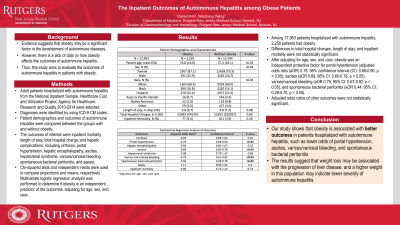Back


Poster Session D - Tuesday Morning
Category: Obesity
D0615 - The Inpatient Outcomes of Autoimmune Hepatitis Among Obese Patients
Tuesday, October 25, 2022
10:00 AM – 12:00 PM ET
Location: Crown Ballroom

Has Audio

Daniel Rim, MD
Rutgers New Jersey Medical School, NJ
Presenting Author(s)
Daniel Rim, MD, Weizheng Wang, MD
Rutgers New Jersey Medical School, Newark, NJ
Introduction: Evidence suggests that obesity may be a significant factor in the development of autoimmune diseases. However, there is a lack of data on how obesity affects the outcomes of autoimmune hepatitis. Thus, this study aims to evaluate the outcomes of autoimmune hepatitis in obese patients.
Methods: Adult patients hospitalized with autoimmune hepatitis from the National Inpatient Sample, Healthcare Cost and Utilization Project, Agency for Healthcare Research and Quality 2010-2014 were selected. Diagnoses were identified by using ICD-9 CM codes. Patient demographics and outcomes of autoimmune hepatitis were compared between the groups with and without obesity. The outcomes of interest were inpatient mortality, length of stay, total hospital charge, and hepatic complications, including cirrhosis, portal hypertension, hepatic encephalopathy, ascites, hepatorenal syndrome, varices/variceal bleeding, spontaneous bacterial peritonitis, and sepsis. Chi-squared tests and independent t-tests were used to compare proportions and means, respectively. Multivariate logistic regression analysis was performed to determine if obesity is an independent predictor of the outcomes, adjusting for age, sex, and race.
Results: Among 17,963 patients hospitalized with autoimmune hepatitis, 2,259 patients were obese. Differences in total hospital charges, length of stay, and inpatient mortality were not statistically significant. After adjusting for age, sex, and race, obesity was an independent protective factor for portal hypertension (adjusted odds ratio (aOR) 0.78, 95% confidence interval (CI): 0.68-0.90, p < 0.05), ascites (aOR 0.69, 95% CI: 0.60-0.78, p < 0.05), varices/variceal bleeding (aOR 0.79, 95% CI: 0.67-0.92, p < 0.05), and spontaneous bacterial peritonitis (aOR 0.44, 95% CI: 0.28-0.70, p < 0.05). Adjusted odds ratios of other outcomes were not statistically significant.
Discussion: Our study shows that obesity is associated with better outcomes in patients hospitalized with autoimmune hepatitis, such as lower odds of portal hypertension, ascites, varices/variceal bleeding, and spontaneous bacterial peritonitis. The results suggest that weight loss may be associated with the progression of liver disease, and a higher weight in this population may indicate lower severity of autoimmune hepatitis.
Disclosures:
Daniel Rim, MD, Weizheng Wang, MD. D0615 - The Inpatient Outcomes of Autoimmune Hepatitis Among Obese Patients, ACG 2022 Annual Scientific Meeting Abstracts. Charlotte, NC: American College of Gastroenterology.
Rutgers New Jersey Medical School, Newark, NJ
Introduction: Evidence suggests that obesity may be a significant factor in the development of autoimmune diseases. However, there is a lack of data on how obesity affects the outcomes of autoimmune hepatitis. Thus, this study aims to evaluate the outcomes of autoimmune hepatitis in obese patients.
Methods: Adult patients hospitalized with autoimmune hepatitis from the National Inpatient Sample, Healthcare Cost and Utilization Project, Agency for Healthcare Research and Quality 2010-2014 were selected. Diagnoses were identified by using ICD-9 CM codes. Patient demographics and outcomes of autoimmune hepatitis were compared between the groups with and without obesity. The outcomes of interest were inpatient mortality, length of stay, total hospital charge, and hepatic complications, including cirrhosis, portal hypertension, hepatic encephalopathy, ascites, hepatorenal syndrome, varices/variceal bleeding, spontaneous bacterial peritonitis, and sepsis. Chi-squared tests and independent t-tests were used to compare proportions and means, respectively. Multivariate logistic regression analysis was performed to determine if obesity is an independent predictor of the outcomes, adjusting for age, sex, and race.
Results: Among 17,963 patients hospitalized with autoimmune hepatitis, 2,259 patients were obese. Differences in total hospital charges, length of stay, and inpatient mortality were not statistically significant. After adjusting for age, sex, and race, obesity was an independent protective factor for portal hypertension (adjusted odds ratio (aOR) 0.78, 95% confidence interval (CI): 0.68-0.90, p < 0.05), ascites (aOR 0.69, 95% CI: 0.60-0.78, p < 0.05), varices/variceal bleeding (aOR 0.79, 95% CI: 0.67-0.92, p < 0.05), and spontaneous bacterial peritonitis (aOR 0.44, 95% CI: 0.28-0.70, p < 0.05). Adjusted odds ratios of other outcomes were not statistically significant.
Discussion: Our study shows that obesity is associated with better outcomes in patients hospitalized with autoimmune hepatitis, such as lower odds of portal hypertension, ascites, varices/variceal bleeding, and spontaneous bacterial peritonitis. The results suggest that weight loss may be associated with the progression of liver disease, and a higher weight in this population may indicate lower severity of autoimmune hepatitis.
Disclosures:
Daniel Rim indicated no relevant financial relationships.
Weizheng Wang indicated no relevant financial relationships.
Daniel Rim, MD, Weizheng Wang, MD. D0615 - The Inpatient Outcomes of Autoimmune Hepatitis Among Obese Patients, ACG 2022 Annual Scientific Meeting Abstracts. Charlotte, NC: American College of Gastroenterology.
